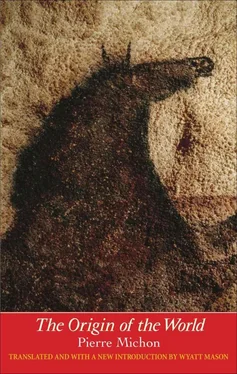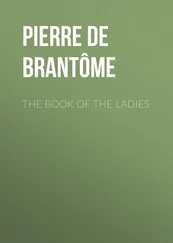I have a very vivid memory. That year at Christmas, Bernard had gotten a bicycle. During the holidays, I had seen him pass and pass again along the steep path in front of Chez Hélène , this superfluous flesh pedaling hard, having a hard time of it on the little contraption, his hands still and his elbows raised, amusingly, his head leaned forward seriously. I’m sure that he was going by there just to be seen by me, to show me that Santa Claus had brought him a bicycle, that he had deserved it and therefore he wasn’t so bad even though he and the master seemed to be having some sort of misunderstanding; but this bicycle would settle things. He wanted to show himself as worthy of such a fine gift by climbing the steep path with all the force in his little legs; and if at last he saw me out front, out of breath from the steep little climb, he waved to me with a modest little motion that was nonetheless proud, magic, as if to extend to this stubborn master the great generosity of Santa Claus so that he could benefit from it too. But Santa Claus hadn’t brought his mother. I turned a deaf ear and barely acknowledged him.
This bicycle annoyed me, as if all my malevolence and guilt had manifested themselves in these three little pieces of aluminum. It pitied me, it was unbearable; and I was disgusted at the thought of Yvonne picking it out in a store in Périgueux, leaving encumbered with this unseemly package like a queen with a shovel at her shoulder. The morning of the first day back, the little one made a desperate move. I had a short stretch of road to cover to reach the school; Bernard, who no doubt had watched for my arrival in the square, passed me on his bicycle, stopped, waited for me, and with his little legs on the ground on one side and the other, pushed the bicycle forward beside me, silently, looking at me out of the corner of his eye with a great deal of introspection, but this time with expectation and fear. I lifted my nose. I was fuming, I had to release this villainy; I deigned to notice him, and without a word about the bicycle, I told him that with his grades he shouldn’t be roaming the streets; and that in addition, at this moment he was importuning his master with rudenesses. I moved off with long strides; when I reached the gate, I turned and saw him stopped back along the road where I had left him, his hands on his handlebars and crying without lowering his head, his face one enormous grimace that children make from time to time, naked, as though intent on having the world witness the injustice of the world, calling from their depths to the sky and their mothers. In his hands, the bicycle’s chrome shone, as useless as Santa Claus. I could easily have cried myself.
Thus in the classroom, in my office, looking at the case looming above all the industrious lowered heads, among which was Bernard’s, in which the iniquitous presence of an unexpected master was veil upon veil hidden by the image of Yvonne in panties getting ready to go, pirouetting on high heels, putting on rouge and rushing to have herself made over in black honey, in this room where the tireless rain ran over the immense windows, I exercised a power that wasn’t quite like that of the old bachelors since no great cows hidden in the shadows leapt visibly forth, no lone wolves, but a power that approached something like it as I ceaselessly conceived a great bright shape that would ruthlessly, endlessly weigh upon the world, white and stamped with red like a Marlboro packet, and sunk my wolf’s teeth into it. And I also sunk them into the lamb that suckled beneath her. The socialist savants in the case doubtless reproved me because it was their place to do so, because they had worked as youngsters to learn the roundhand, the slanting round-hand, the roman , to hide all this, to disguise it beneath enormous paraphs, draped initials, but they absolved me because beneath their little beards they had wolves’ teeth as well to dig into fatter necks than were peeking out from children’s car coats, thicker thighs beneath crinoline petticoats. For the others, those who had hooked and gutted their flounder, they too condemned me, revering me as they had condemned in secret and revered openly those who scorned the depiction of flounder and instead had made great callipygians under the earth, reigning with this brutal dream. But I couldn’t reign over Bernard, not exactly, perhaps because we were alike: doubtless he suffered, but behind this suffering, his miscalculation of the number of superfluous objects — a bicycle, a tyrannical instructor, Jeanjean’s harvester, and Jeanjean himself to whom, strangely, his mother would go in her Sunday best, Santa Claus, and his real father too, who toiled in the beyond, which is to say the supermarket in Périgueux, who took him on vacations from time to time — under the weight of incompletion Bernard had in hand an invincible, dolorous plenty, dolorous since for him she ceased at that region above her stockings where she filled herself with something invisible, voluntary, and massive like the God of the catechism, but a plenty he clung to nonetheless, to the backs of her knees, to her full cheeks, to her enormous earrings. And like me, lifting my nose from between two math problems, two paragraphs, Bernard watched this replenishment through the windows, behind the rain that falls to earth and makes room for our dreams, the satiety of our dreams behind this gray curtain where everything is permitted.
The waters rose.
A night came when there was a thick fog, moveless and almost hot, a fog like there had been the night I had arrived. I was eating my cold cuts when Jean the Fisherman came in with his acolytes; their oilskins were dulled as if dulled by breath. Slung across their stomachs were shoulder bags stuffed to bursting. Jean was beaming: he laughed to himself; he surveyed the scene and affected a sort of slowness beneath which his eagerness danced: the drinkers weren’t saying a word, they were laughing too, bubbly with impatience as they settled their glasses down gently; they played along with this game that Jean was offering them. At the counter, he calmly undid the straps of the shoulder bag and thrust his hand inside with a gesture that bespoke the silent transgression of some law, a transgression that brought pleasure; he withdrew two or three carp that he hoisted like an Arawak, like a Mohican brandishing by its gills the great Sturgeon one sees only in dreams. The drinkers were unprepared for what he showed them, for these weren’t common fish, weren’t even mirror carp with their large sparse scales: these were leather carp, scaleless and smooth like water, shimmering and bare. They gleamed and changed in the half-light, under the antique red. The fish collapsed one after another to the counter with flat slaps. The acolytes had them too, though they revealed them more modestly, hoping only to show that they were worthy of their master, as we would expect of vassals. Jean still had a mischievous gleam in his eye, he smiled, he wasn’t done yet; he asked the room to guess where he had caught them. Some quickly said near a dam on the Little Beune, toward Saint-Amand, where the leather carp and others sleep far from the live waters they never visit, gleaming invisibly in their darkness, in movelessness, gorging themselves on mud and from it forging a flesh imponderably smooth that barely touches one’s tongue. But they hadn’t come from there. Not from there, nor far downstream on the smooth stretches of water in Dordogne. Jean looked at the carp for a moment; then, turning his head violently toward us, he said: “I caught them down below. They were coming down the Beune.” A report of crocodiles slipping between the bulrushes toward Chez-Quéret wouldn’t have shocked us more. It was like some Old Testament marvel. Gudgeons fall in the rain, sturgeons spawn in the Vézère; queens that are carp from their bellies down are surprised in their baths by an ardent man, their tails beat fervently, splashing water into the sky. They flee, crying beneath the blade of the moon. Hélène took them pensively and went to gut them in the sink. She ran the water. She took a moment to reflect, as did Jean; they looked at all the pink hidden in fish, revealed when one opens them. Below, terrified, carp were tumbling in the current, unable to survive, shaken deep within, their white leather torn by stones; through the fog Jean the Fisherman lifted them with one movement, they swelled like wineskins, bursting, greedily, mouths open wide. Boatmen who had dismounted and were crouched in the bulrush watched them leap at last onto the grass to die. They showed us their white teeth. Hélène poured a few drops from a bottle into the sink, a scent stronger than the barrels, than the cigarette butts, this bleach that diffuses the smell of killing. Elsewhere, Jeanjean was honing this nothing, other carps trembling under his hands, making them rise from the water, reviving them indefinitely in the moss, hoisting them, suffocating, by their gills, and plunging them under again; Yvonne in this bath with her mouth open was singing a hard song, was dying, indefinitely, was saying as much. Jean the Fisherman was drinking a rum, his head nodding gently, the night stronger than he. The oilskins were departing, and suddenly outside the fog drew them in. Hélène’s hands on her apron smelled of fish, she watched her son who knew how to catch them: when you have seen the great Sturgeon, you know where to find the others, or so he told you in a dream. Down below, Bernard’s eyes were open in the dark to the bright fog. And at last we all were sleeping, while the Beune flowed on.
Читать дальше












